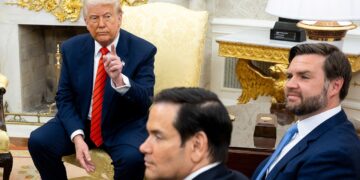
Argentina’s new president, Javier Milei, who won his election last year by wielding a chainsaw illustrating his intention to cut government spending, boasted last week that his policies are working:
Contrary to the forecasts made by most political leaders, professional economists, television, and pettifoggers, I would like to announce that the national public sector recorded a financial surplus of more than 275 billion pesos ($310 million).
This is Argentina’s first budget surplus since 2008, and an extraordinary exception to the rule: the country’s government has run a deficit in 113 out of its last 123 years.
Recovering from the addiction to paper money printed to cover the government’s excessive spending is going to be hard, said Milei: “The situation we are going through is hard, [but] we have already gone halfway … the effort will be worth it.” He added:
We are making the impossible possible, with the majority of [politicians], unions, journalists, and economic actors against us.
Inflation is plummeting and is every month lower than expected.
Indeed. When Milei took office in December, the monthly — monthly! — inflation rate was an eye-popping 25.5 percent! But in January it dropped to 20.6 percent; in February it dropped further, to 15 percent; and in March it was expected to drop into single digits. That report is due out tomorrow.
How did Milei do it? Pundits, tongue in cheek, have suggested it’s because the new president is listening to his dogs. They are named Murray, Milton, Robert, and Lucas, after leading Austrian school economists Murray Rothbard, Milton Friedman, and Robert Lucas.
Milei has followed their free-market prescriptions. First, he issued 350 executive orders reversing the socialist policies of his predecessors. He reduced the number of government agencies from 21 to nine (ending some 5,000 government jobs), one of them the “Department for Women, Gender, and Diversity.” He removed rent and price controls from huge swaths of the economy (the socialists’ answer to roaring inflation resulting from their policies of inflating the currency to pay for their spending programs). He halted nearly 90 percent of public works projects in anticipation of having them privatized. He cut subsidies.
And this is just the start. In March, Milei unveiled plans to end more than 200,000 social welfare programs and cut another 70,000 jobs from the state sector.
People are “seeing the light at the end of the tunnel,” said Milei, referring to public opinion polls that continue to support his agenda even as the changes inflict pain on parts of the economy used to regular insertions of government largesse. Those familiar with Alcoholics Anonymous no doubt recognize the symptoms of going “cold turkey.”
The financial markets are reacting to Milei’s austerity measures. The Argentine peso has strengthened since his inauguration, the country’s “risk index” used by investors is now at its lowest level since 2020, and the prices of the country’s bonds have risen from last year’s lows.
Milei is not shy about placing the blame for his country’s woes on socialism. On January 17 he took the podium at the World Economic Forum (WEF) in Davos, Switzerland, to skewer the elites in attendance:
The West is in danger because those who are supposed to defend Western values are co-opted by a worldview that leads to socialism.… The main leaders of the Western world have abandoned the model of freedom….
[Socialism] is a model that has impoverished and failed … in every country where it was tried. It is a failure economically. It is a failure socially. It is a failure culturally. And it [has] also killed more than 100 million human beings.
And then, according to Carlos Beltramo, a representative of the Population Research Institute (PRI) who attended Milei’s talk, the president looked directly at Klaus Schwab and said: “Don’t be intimidated by the political caste or the parasites who live off the state. Don’t surrender to a political class that only wants to perpetuate itself in power and preserve its privileges.” At that point, noted Beltramo, Schwab “bolted from the room.”
In February Milei reiterated the underlying causes of Argentina’s problems, when addressing the Conservative Political Action Conference:
The corrupt caste is made up of thieving politicians, who put their privileges above the welfare of Argentines. By corrupt businessmen who do business with corrupt politicians. By corrupt media outlets who are very angry with us because we eliminated their state advertising.
Also, trade unionists who take care of their business, against the people. And professionals who live off the religion of the state.
Therefore, they will become aware of the great fight we are putting up.
But we are not going to give up making Argentina great again.
If these early improvements are any indication, Milei is well on his way to doing precisely that.
Related articles:
Argentina’s Milei Continues “Shock Therapy” Reforms
Argentina’s Milei Cuts 5,000 Government Jobs
Fruits of Milei’s Efforts: $600M Fiscal Surplus in Two Months
Embracing Economic Freedom: Lessons from Javier Milei’s World Economic Forum Address
From Alberdi to Milei: Argentina’s Rich History of Free-market Economic Success
































 Reaction & Commentary
Reaction & Commentary


















